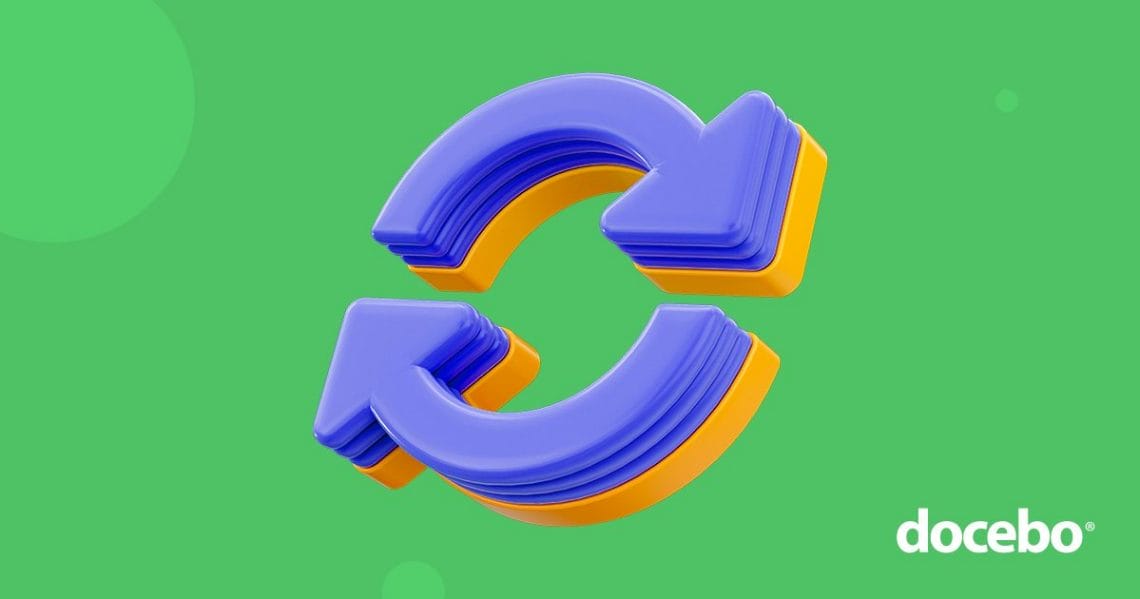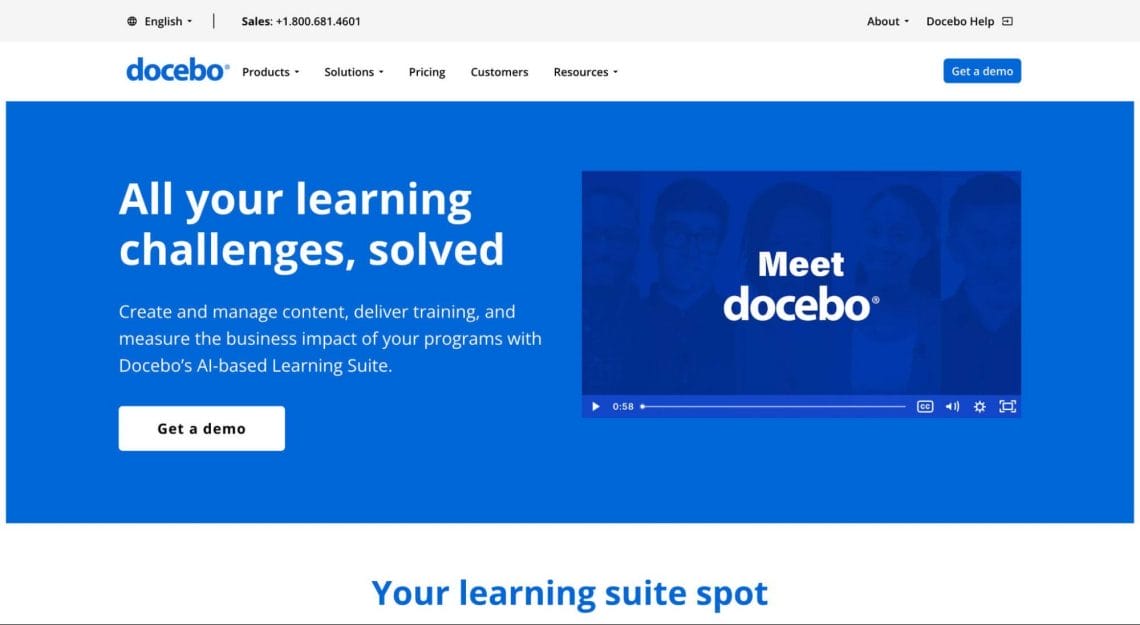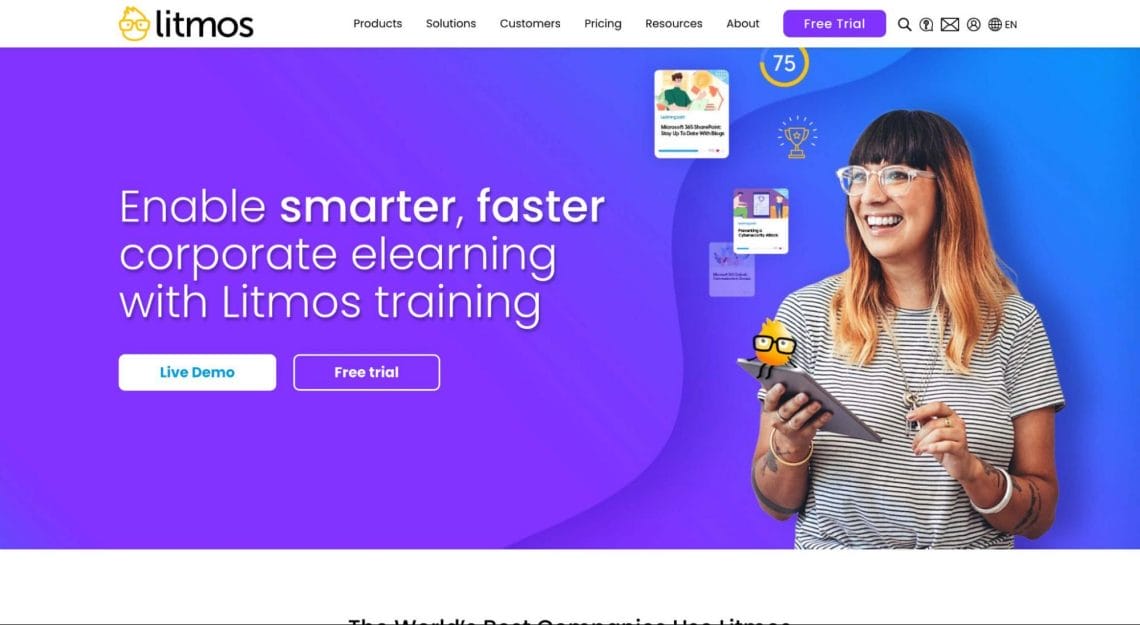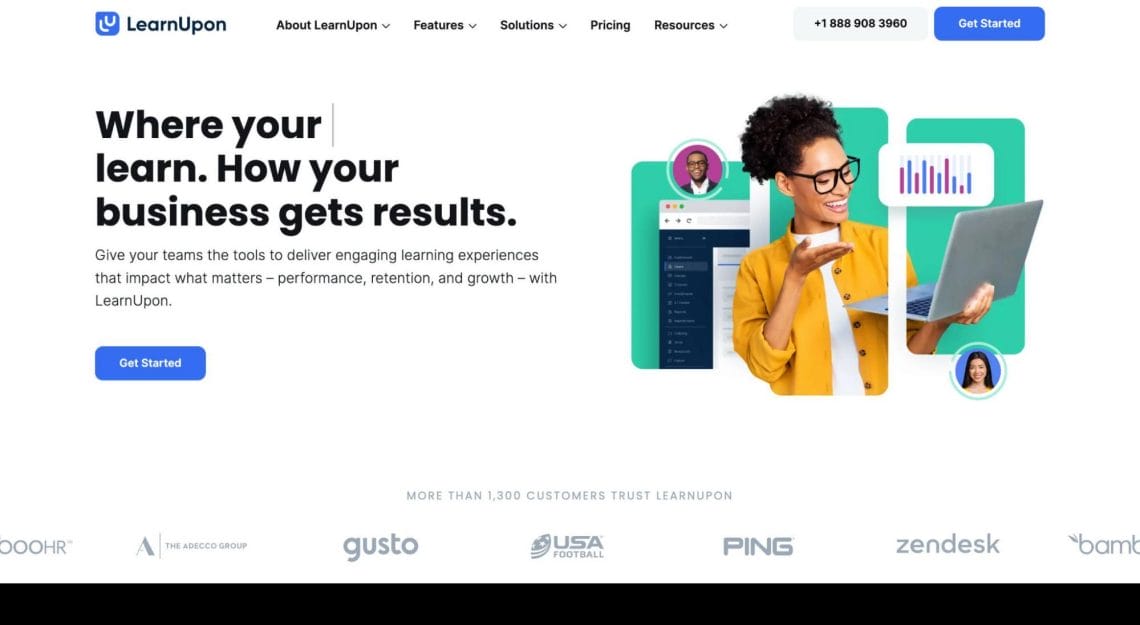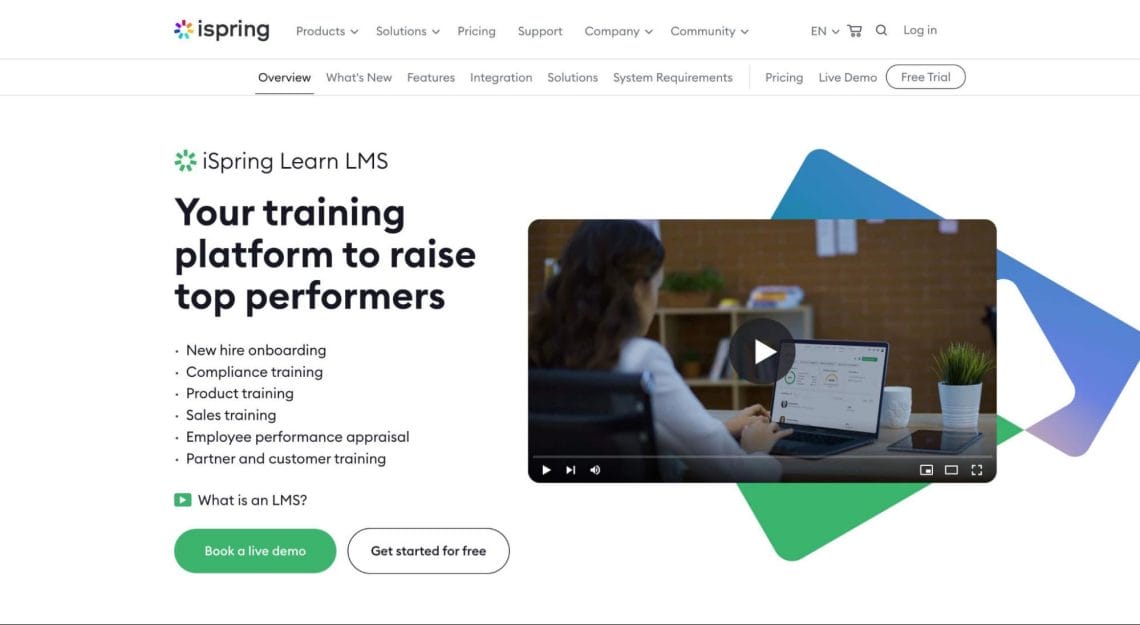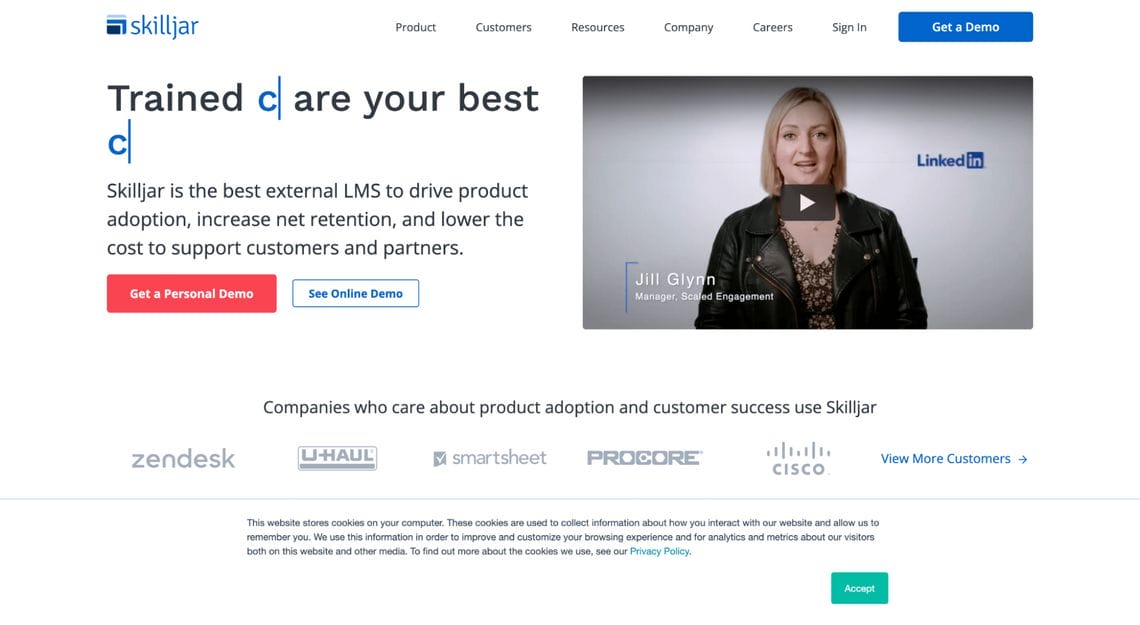Whether you’re looking for a new learning management system (LMS) or have been around learning platforms for a long time, you’ve probably heard the acronym SCORM.
SCORM courses, SCORM compliance… What does it all mean?
Well, the Sharable Content Object Reference Model (that’s the full name, so you can see why they shortened it) is an e-learning standard aiming to make it easier for learning professionals to create and deliver learning content.
Of course, there’s a bit more to it than just this. You should know some things when picking SCORM-compliant LMSs, and this guide will go over it all.
So, let’s get ready to demystify SCORM once and for all, and help you pick the right learning management system in the process.
What is a SCORM-compliant LMS?
A SCORM-compliant LMS is a learning management system that supports and conforms to the SCORM standard. This is important because authoring tools used to make online courses fall under this standard too.
When you make an e-learning course with a SCORM-compliant authoring tool, you can easily import it into your LMS — as long as the LMS is also compliant.
This is especially useful for LMS migration since the SCORM file also contains information about learner progress, like which courses they completed and their assessment results.
In short, a SCORM-compliant LMS is a learning platform that adheres to the technical standards set out in the SCORM model. As such, it enables e-learning content to be easily imported, delivered, and tracked across different systems.
How to choose a SCORM-compliant LMS
We did mention in the intro that there’s a little more to this whole SCORM business than compatibility.
Several factors are at play when choosing a SCORM-compliant LMS to deploy your online learning efforts. Here’s a closer look.
See which versions of SCORM it supports
While learning experience designers and e-learning professionals typically talk about SCORM compatibility in the singular, there are several versions of this standard.
SCORM is one of the oldest e-learning industry standards, and it’s been upgraded and expanded over the years.
The first version came out in 2000 (SCORM 1.0), while an updated version came a year later – SCORM 1.2. This version is still the most widely used because most LMSs and authoring tools support it.
The second-most-popular version is SCORM 2004, which added support for things like adaptive learning pathways.
Finally, there is the Tin Can API (also known as Experience API or xAPI) which is meant to be the successor to the SCORM standard. Most notably, xAPI adds the ability to track learning experiences outside of the e-learning content in the LMS, such as in-person workshops.
Which version of the SCORM standard you should look for depends on your learning needs but, in general, newer versions are best for future-proofing your training initiatives.
However, if you have a lot of legacy e-learning content, you should stick to an older standard.
See if the LMS is certified by ADL. If not, which API elements are supported?
The ADL stands for Advanced Distributed Learning Initiative, a program of the US federal government. This is the body that made the SCORM standard and the only one that can certify an LMS as fully SCORM-compliant.
To get the certification, LMS vendors must pass ADL’s testing process.
Choosing a certified LMS is the easiest way to deal with SCORM. That said, if you find a potential solution that isn’t certified, that’s not necessarily a dealbreaker. You’ll have to check with the potential LMS provider to see which features can still support SCORM.
See what level of RTE (runtime environment) the LMS supports
A runtime environment (RTE) is the environment in which a computer program runs. Sounds logical, right?
The RTE also governs the functionality of how the program communicates data between the computer running the program and the computer hosting the program.
With SCORM-compliant LMS platforms, you don’t necessarily have to worry about RTE communication at all.
However, if you don’t have RTE communication, your LMS will just be able to launch the Sharable Content Objects or SCOs (the individual assets that make up an online course). That means it won’t be able to gather valuable data about how the learner interacts with it.
To collect learning data, you’ll need an LMS that supports RTE communication. There are two levels to this. The first tier consists of industry-standard basic data models such as:
- cmi.completion_status and cmi.success_status: indicate when a learner has completed the course and if they passed.
- cmi.score.scaled: indicates the score a learner achieved on any assignment within an SCO
- cmi.session_time: reports how much time a learner has spent in an SCO
- cmi.location: allows learners to use a bookmarking feature for longer courses
- cmi.exit: controls how learners exit an SCO and whether the LMS lets them resume an attempt or makes them start over
Second-tier data models add extra functionality:
- interactions: can report the results of each question response or the path a learner takes through a learning simulation
- objectives: allow for more granular reporting about the learners’ mastery of learning objectives, essential for large SCOs
- cmi.progress_measure: adds the capability to add a percentage-complete measure that lets an LMS display a percentage progress bar (SCORM 2004 only)
Whether or not you go for a platform with second-tier RTE depends on how granular you want your LMS metrics to be.
See how well the LMS works with your authoring tools
The whole point of SCORM is to achieve interoperability between the authoring tools and the LMS.
That means you can create SCORM packages in an authoring tool of your choice and then upload them into whatever LMS platform you’re using to manage your online training programs.
Still, different LMSs handle this process differently. Some will offer the option of bulk upload, which is great if you already have many learning materials ready.
Other LMSs come with authoring tools built in. Even then, this needs to be SCORM-compatible because you might want to export these to another platform later.
See if you can operate the LMS without any plugins
Depending on how the vendor built the LMS, you might need to install plugins to get full functionality and compatibility with the SCORM standards.
Sometimes, especially in older LMSs, you’ll need to install Microsoft Silverlight or Adobe Flash. These are both older technologies with significant limitations, particularly around mobile devices.
Ideally, opt for a platform that uses modern tech like HTML5 and JavaScript, especially if you want to use mobile learning. This allows your e-learning software to run directly in the web browser on any internet-enabled device.
See if the LMS uses the Rustici Engine
The Rustici Engine is a software platform integrated into an LMS to manage the import and launch of SCORM, xAPI, cmi5, and other e-learning standard files.
It also comes with a player for SCORM-compliant content that works on various platforms, from desktop computers to smartphones and tablets.
The Rustici Engine (formerly known as the SCORM Engine) is considered by many to be the gold standard in e-learning training content management and delivery.
Now that you know what to look for in a SCORM-compliant LMS, let’s review some examples of LMS platforms that work with this set of standards.
5 of the best SCORM-compliant learning management systems
Having a learning management system in your tech stack is a necessity these days for any company. From onboarding to employee training, these platforms support your organization’s learning and development efforts.
There are many LMS features to consider when choosing a vendor, and SCORM compatibility is a big factor.
So, here are our top picks for LMS platforms that conform to the SCORM standard.
Platform #1: Docebo
Docebo is a cloud-based LMS that allows organizations to create, manage, deliver, and assess online training. It comes with a user-friendly mobile app for learners on the go.
With modern functionality like gamification and social learning, Docebo can deliver the learning experiences that today’s learners require. What’s more, its advanced analytics and reporting allow L&D teams to pull insightful data on training activities.
Of course, since it’s on this list, this LMS is compatible with SCORM. Specifically, SCORM 1.2 and SCORM 2004 third edition standards; the two most widely used standards in the e-learning industry.
Who Is It For?
Any company that needs to deliver learning online, such as for sales or compliance training, can use Docebo. Moreover, since the platform is compatible with the two most common SCORM standards, you can import any existing learning courses.
Similarly, any SCORM-compliant courses you buy from third-party vendors will work in Docebo.
Top Features
- Compatible with SCORM 1.2 and SCORM 2004 third edition
- Gamification and social learning features
- AI-based features, including virtual tutors
Platform #2: Litmos
Litmos is cloud-based LMS software designed to help organizations deliver training to their employees, stakeholders, and partners.
Source: Litmos
Litmos allows users to customize their training materials with logos and colors, ensuring the learning environment matches the company’s overall branding.
Like most modern LMSs, it can deliver training to many users across devices such as desktop computers, smartphones, and tablets.
When it comes to SCORM, Litmos is compatible with SCORM 1.2 and SCORM 2004 (but only the first and second editions).
Who Is It For?
Litmos focuses on being fast to deploy, user-friendly, and customizable. Therefore, companies that want to get their learning programs up and running quickly and customize the experience to fit their brand might want to look into this LMS.
Top Features
- Compatible with SCORM 1.2 and SCORM 2004 (first and second editions)
- High level of customization
- Built-in content authoring
Platform #3: LearnUpon
LearnUpon is another option for companies looking for a cloud-based LMS that’s SCORM-compatible.
Source: LearnUpon
Typical of cloud-based LMSs, LearnUpon supports multiple use cases, including partner and member training. In addition to this, you can expect features like gamification, social learning, and integrations with popular webinar platforms that enable blended learning.
Who Is It For?
If you’re looking for an LMS with all the modern features and SCORM compatibility, LearnUpon can be a good solution. It supports importing courses in the SCORM 1.2 and SCORM 2004 formats, so most of your existing SCORM files will be usable in this LMS.
Top Features
- Compatible with SCORM 1.2 and SCORM 2004 (third and fourth editions)
- Integrations with webinar platforms
- Learning portals: separate learning environments for different audiences
Platform #4: iSpring Learn LMS
iSpring Learn is the cloud-based LMS offered by iSpring Solutions, the creators of iSpring Suite—an e-learning authoring platform.
Source: iSpring Learn LMS
Companies can use iSpring Learn to power various kinds of online training like onboarding and sales training. The LMS also has an in-built employee performance appraisal tool.
Who Is It For?
One feature that sets iSpring apart from most LMSs is that it offers unlimited cloud storage as part of its subscription pricing plan. That means instructional designers and other e-learning staff can upload as many files as they need.
Also, companies can white-label this LMS, both on the desktop and in mobile apps.
If you also choose to use iSpring Suite as your authoring tool, you can create content in PowerPoint, which the platform will automatically convert into e-learning training courses.
Top Features
- Compatible with SCORM 1.2 and SCORM 2004
- Unlimited cloud storage
- Built-in employee performance appraisal
Platform #5: Skilljar
Skilljar is an LMS platform that focuses on customer and partner education.
Source: Skilljar
Because of that, Skilljar focuses on providing users with native data and analytics capabilities to measure the effectiveness of their learning content.
Additionally, it provides full Salesforce integration and the option to export data in CSV format.
Who Is It For?
Unlike other LMSs on this list that aim to be an all-in-one solution for online training, Skilljar focuses on educating external stakeholders – your customers and your partners.
As such, this LMS may be the best fit for companies with products or services that require investment in customer success. Or companies that have channel partners that need training.
Top Features
- Compatible with SCORM 1.2 and SCORM 2004 (third and fourth editions)
- Built-in data gathering and analytics
- Integration with Salesforce
Now over to you
There are many different solutions for corporate training and e-learning. With so many LMSs and authoring tools on the market, it’s necessary to have standards to govern them.
SCORM is the most popular of these standards and lets various parts of the e-learning puzzle communicate with each other. When using SCORM-compliant tools to create and deliver your training, you never have to worry about whether or not a course built on one platform will work on another.
Docebo supports the SCORM standard, which means you can easily import your existing courses or courses you buy from third parties later. In addition, Docebo comes with advanced features such as gamification, AI tutors, social learning, and more to optimize employee training in your organization.
See what Docebo can do for your organization – book a demo today!

